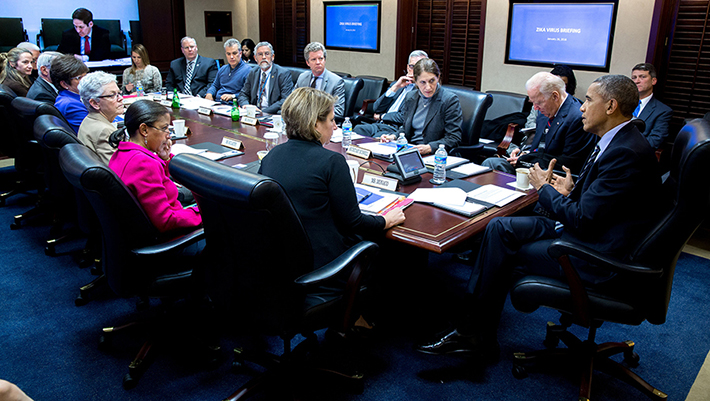
By Amy Pope
(Trice Edney Wire) – If you’ve been thinking about traveling to warmer climates or have been catching a few news stories, you may have heard about something called the Zika virus – a disease spread primarily through mosquito bites.
Zika causes mild illness in some, however, we are closely tracking and responding to recent outbreaks of this virus because the Centers for Disease Control (CDC) issued reports that indicate Zika may be linked to serious birth defects in babies of mothers who were infected with this virus while pregnant.
While this virus is not new, it is new to the Americas. The first case was reported in Brazil just last spring. Since that time, it has spread through South and Central America, and the Caribbean. No locally transmitted Zika cases from mosquitoes have been reported in the continental U.S., but cases have been reported in travelers returning from areas where Zika is present. As Zika continues to spread in our region, the number of cases among travelers visiting or returning to the U.S. is likely to increase.
In addition to serving as part of the President’s national security team, I am also a mom. I personally know how important it is to have all of the information you need to keep yourself and your family healthy and safe. There is still much we don’t know about this virus but we’re learning more every day. To help keep you up-to-date as we learn more, we have all the latest updates you need in one place: www.cdc.gov/Zika.
Meanwhile, here are a few answers to questions many Americans may have about the virus, how it spreads, and who is at risk.:
What is the Zika virus?
The Zika virus is spread primarily through the bite of an infected mosquito. These are the same mosquitoes that spread other viruses like dengue and chikungunya. Only about one in five people infected with the Zika virus will feel sick. In those that do, symptoms are usually mild and can include fever, rash, joint pain and red eye.
How is the President working with local leaders to combat Zika?
Since late last year, President Obama has directed his public health and national security teams to closely track and aggressively respond to the threat of Zika virus at home and abroad. Zika virus is primarily transmitted by mosquito bites, primarily from the infected Aedes aegypti mosquito. And while for most people, a Zika infection is not life-threatening, for women who are infected while pregnant, there are reports of serious birth defects and other poor pregnancy outcomes associated with the infection.
While we haven’t seen Zika transmission by mosquitos in the continental United States, we have seen transmission in Puerto Rico and the U.S. Virgin Islands, in addition to cases reported in Central and South America, the Caribbean, and the Pacific Islands. And we know that this particular mosquito lives in certain parts of the southern United States, so we must prepare as the seasons change and weather gets warmer.
The President recently met with governors from each state and announced the formation of a coalition of experts and federal, state, and local leaders to combat the spread of Zika by attacking the spread of the Aedes aegypti mosquito.
As the President said, we all have to remain vigilant when it comes to combatting the spread of diseases like Zika. We are going to make sure that each at-risk state – particularly those in the South – has the resources to do so. The Centers for Disease Control and Prevention (CDC) will host a summit of nation-wide leaders designated by governors to make sure the best information and practices for addressing Zika are reaching local communities across the country.
This broad coalition will create action plans to empower communities by providing resources to:
1. Understand Zika’s transmission and identify at-risk communities;
2. Rapidly detect the spread of Zika and respond to cases;
3. Provide clear, timely public information on the effects and spread of Zika.
This is not the first time that communities have responded to infections transmitted by the Aedes aegypti mosquito. We have a strong history of success in managing the spread of similar viruses – like Dengue – but we need to work together with governors and local leaders, who have a proven track record in providing real solutions. Governors, mayors, and community leaders get things done, and we can – and must – learn from each other.
We’re asking each governor to designate a senior representative to join our coalition and help us ensure state and local health officials have all of the tools and information available to them to combat this mosquito and protect our communities. The solutions range from simple things – like motivating communities to pick up trash that mosquitos can use as breeding grounds or using screens to prevent mosquitos from entering the house – to more sophisticated solutions on the cutting edge of science.
To make sure that communities have the resources they need to minimize local transmission of Zika and that other countries affected by or at risk from Zika have the support they need to combat it, the President submitted a proposal to Congress requesting approximately $1.9 billion in emergency funding. In addition to supporting local responses to threat here and abroad, emergency funds will support an acceleration of research and development on vaccines, therapies, and improved diagnostics as well as on advanced approaches to mosquito control.
President Obama is calling on Congress to fight the Zika virus
How is Zika transmitted?
Zika is primarily spread to people through the bite of infected Aedes mosquitoes. It can also be transmitted from a pregnant mother to her baby during pregnancy, though we do not know how often that transmission occurs. Check out this link for some general information on transmission and other important resources.
There is also evidence that the Zika virus can be sexually transmitted by a man to his partners. At this time, however, there is no evidence that women can transmit the Zika virus to their sex partners. You can learn more about the Zika virus and guidance to avoid sexual transmission here.
Where are people contracting Zika?
People are contracting Zika in areas where Aedes mosquitoes are present, which include South America, Central America and the Caribbean. As the CDC notes, specific areas where the Zika virus is being transmitted are likely to change over time, so please check here for the most updated information.
Who is at risk of being infected?
Anyone who is living in or traveling to an area where the virus is found is at risk for infection.
Why are there specific recommendations for pregnant women?
There may be a link between a serious birth defect called microcephaly – a condition in which a baby’s head is smaller than expected – and other poor pregnancy outcomes and a Zika infection in a mother during pregnancy. While the link between Zika and these outcomes is being investigated the CDC recommends that you take special precautions if you fall into one of these groups:
- If you are pregnant (in any trimester): You should consider postponing travel to any area where the Zika virus is active.
- If you must travel to an active region, talk to your doctor first and follow the steps to prevent mosquito bites during your trip.
- If you are trying to become pregnant, before you travel, talk to your doctor about your plans to become pregnant and the risks posed from infection.
If you fall into one of these groups, the CDC has provided thorough information on what you should do here.
What can I do to prevent a Zika infection?
Right now, there is no vaccine to prevent this disease. The best way to prevent diseases by mosquitoes is to protect yourself from getting bitten.
Here’s how:
- Wear long-sleeved shirts and long pants.
- Stay in places with air conditioning or that use window, door screens, and netting to keep mosquitoes outside.
- Use Environmental Protection Agency (EPA)-registered insect repellents. All EPA-registered insect repellents are evaluated for safety and effectiveness.
- Treat clothing and gear with permethrin or purchase permethrin-treated items.
- Sleep under a mosquito bed net if you are overseas or outside and are not able to protect yourself from mosquito bites.
Should we be concerned about Zika in the United States?
The U.S. mainland does have Aedes species mosquitoes that can become infected with and spread Zika virus. U.S. travelers who visit a country where Zika is found could become infected if bitten by a mosquito.
With the recent outbreaks in the Americas, the number of Zika virus disease cases among travelers visiting or returning to the United States will likely increase. These imported cases may result in local spread of the virus in some areas of the United States. CDC has been monitoring these epidemics and is prepared to address cases imported into the United States and cases transmitted locally.
What is the President doing to help combat and control the spread of the Zika virus?
The President recently met with CDC Director Dr. Thomas Frieden and his other health and national security advisors to discuss the potential spread of the Zika virus in the U.S.
He emphasized the need to accelerate research efforts to make available diagnostic tests, to develop vaccines and therapeutics, and to ensure that all Americans have information about the Zika virus and steps they can take to better protect themselves.
The President recently met with CDC Director Dr. Thomas Frieden and his other health and national security advisors to discuss the rapid spread of Zika virus in the Americas. He emphasized the need to accelerate research efforts to make available diagnostic tests, to develop vaccines and therapeutics, and to ensure that all Americans have information about the Zika virus and steps they can take to better protect themselves.
So, President Obama has requested Congress to help combat this disease by providing $1.8 billion in emergency funding to build on our ongoing efforts. Specifically, we’d use the requested resources to rapidly expand mosquito control programs, accelerate vaccine research and diagnostic development, enable testing and procurement of vaccines and diagnostics, educate health care providers, pregnant women and their partners, improve epidemiology and expand laboratory testing capacity, improve health services and support for low-income pregnant women, and enhance the ability of Zika-affected countries to better combat mosquitoes and control transmission.
Amy Pope is Deputy Assistant to President Obama for Homeland Security.















